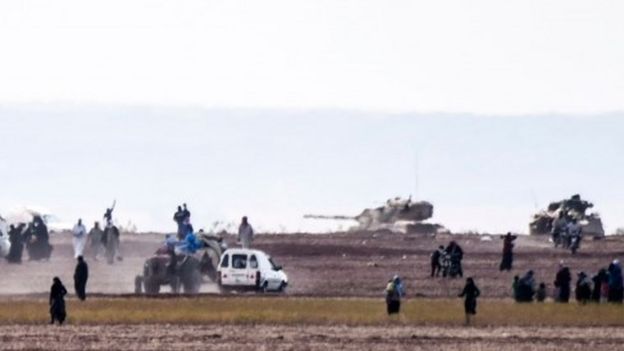The Malevolence of Conflict
"Outright military victory in a civil war often comes at the price of horrific [even genocidal] levels of violence against the defeated, including their civilian populations."
Professor Walter and Kenneth M. Pollak, Middle East experts
"[Studies have shown] if you have outside intervention on both sides, duration [of the civil war conflict] is significantly greater."
"It's more important to stop the other side from winning than it is to win yourself."
Professor D. Fearon, Stanford University civil war researcher
 |
|
|
That message got through to the protesters who swiftly became an unaligned rebel army of various militias. The message went even further when opportunistic Islamist terrorist groups seeing an opening to expand their presence elsewhere than in Somalia, Iraq and Libya, among other conflict zones, streamed into Syria to take up the fight against the regime and just incidentally against the rebels who rejected their brand of Islamism.
The message had a steep pricetag; at the present time it hovers around 500,000 Syrians whose lives were forfeit, and seven or so million displaced, four million of whom have become refugees, almost half of whom have found haven outside the Middle East. Does Syria exist any longer? It seems, according to experts in the field of conflict and civil war, that this one defies stereotypes completely. Any other such civil war would have been fought and an impasse declared, or a victorious half decided out of sheer exhaustion.
The emergence of outside elements, all seeing a stake for themselves in the flagging war, helped one side or another, for some of the near-based outsiders it was a sectarian reflection of support, and for international outsiders the recognition of proxy entitlements to become involved, alongside the opportunity to exert greater influence in the geographic vicinity as a whole. Foreign powers' intervention in a broad stroke to prevent total collapse and worse catastrophe ended up fuelling the civil war.
The principals' involvement, outside the Syrian regime, represent regional and world powers; the United States, Russia, Iran, Saudi Arabia, Turkey and NATO forces. Supplies from abroad to the rebel factions and to the Syrian regime gave fresh impetus and determination to any flagging elements in the tedious conflict whose greatest victims were -- as ever it is, anywhere in the world where such conflicts flare -- civilians, and of course, children, deprived of their childhood, their education, often their lives.
The regime and the rebels will not have the opportunity nor the wish to settle, to move aside from conflict, since they are urged by their supporters and through the constant supply of weapons, to try a little harder and much longer, to prevail. The Kurds have much to gain, but to realize that hoped-for gain, a costly dedication to routing the Islamic State of Iraq and the Levant has fallen, for the greater part, to their courage and determination, augmented by U.S.-led airstrikes and training and weapons-provisions.
The regime has the support of the Lebanese Hezbollah, Iran-backed Shiite militias, the al Quds Republican Guards Corps, and Russia without whose air strikes Syria would long have been surrendered to the Syrian Sunni rebels, along with the lesser of the foreign terrorist groups they have reconciled with, as a bitter pill. The indiscriminate mass killings of civilians can be laid directly at the feet of Syrian President Bashar al-Assad for whom the loss of the majority of his population is a trifle.
But the entire conflict and its carnage results from various factions with their singular aims making anything resembling a peace agreement, let alone a permanent ceasefire, a distant potential. Should the regime be successfully overthrown at this point, the rebel factions and the various jihadist groups would then turn on one another for control of territory. Not only is Syria bifurcated and shattered as a country, the area has been totally driven to excesses of complete dysfunction.
And when it seems that matters cannot possibly become even worse than they are, they somehow manage to do just that. Assad said often enough that if Syria falls, the world will be witness to a much large catastrophe befalling the entire Middle East, as though Syria represented the key that would unlock the Islamists' chest of catastrophic chaos on a scale hardly imaginable. Too much of what he foresaw has up to now come to pass, let us hope that the dire darkness he, a mass murderer predicts, will not.
Labels: Civil War, Jihad, Middle East, Rebels, Russia, Syria, Terrorism, United States

<< Home